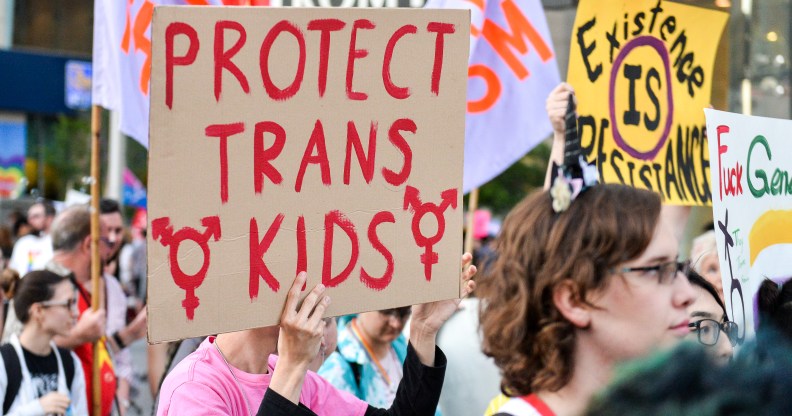High Court finally decides to hear landmark legal challenge over trans teens’ access to puberty blockers

(Anatoliy Cherkasov/SOPA Images/LightRocket via Getty)
The UK’s High Court has granted a landmark judicial review into whether young transgender people can give informed consent to puberty blockers.
The medication is prescribed to trans teens by specialist gender doctors at the NHS’s gender clinic for under 18s.
The legal challenge is an attempt to force trans teens to go before a judge before being given medical treatment by doctors.
Transgender children’s charity Mermaids said it was taking “a close interest” in the case and “may apply to intervene in this claim”.
A spokesperson for Mermaids said: “Mermaids is taking a close interest in this judicial review.
“It is clearly relevant to the work we have done for several decades, supporting transgender and gender-diverse children and young people.
“We will take steps to support those for whom we advocate if it becomes necessary and may apply to intervene in this claim.”
The case is being brought to challenge the approach of the Gender Identity Development Service (GIDS) at the NHS’s Tavistock and Portman trust in London.
GIDS provides healthcare to young trans people, which can include puberty-blocking medication for under 16s.
In a statement, GIDS said that it “welcomed the opportunity” to talk about its service, emphasising that physical interventions like puberty blockers are used by only “a minority” of patients and that in some cases, “doing nothing is not a neutral act”.
Puberty blockers delay puberty until a trans teenager is old enough to make decisions about having gender-affirming medical treatment.
A landmark January 2020 study, published in medical journal Pediatrics, found that puberty blockers are a “life-saving” treatment and if trans teenagers have access to the medication, their chance of suicide and mental-health problems significantly declines.
https://twitter.com/Mermaids_Gender/status/1233458676150697984?s=20
The case is being brought by a woman in her twenties called Keira Bell, a former patient of the Tavistock.
In a statement on the crowdfunding website for her case, Bell said: “I do not believe that children and young people can consent to the use of powerful and experimental hormone drugs like I did.
“Hormone changing drugs and surgery does not work for everyone and it certainly should not be offered to someone under the age of 18 when they are emotionally and mentally vulnerable.”
GIDS said in a statement that they welcome the opportunity to talk about their service and “to stand up for our dedicated staff who put the best interests of the young people and families at the heart of their practice”.
“While physical intervention is only accessed by a minority of our patients, it is important that this option remains available and is informed by the latest evidence,” GIDS said.
“It is very clear from our first-hand experience of working with these young people and their families that, for some, doing nothing is not a neutral act.
“We also believe in the rights of young people, with support from their families and clinicians, to make informed decisions about their care, in the way they would do in any other aspect of their health.
“We welcome the opportunity to make the case for the quality of care the service provides in a thorough and nuanced way. Our work in GIDS is provided in accordance with best practice and relevant national and international specifications and guidelines.
“We are disturbed by the level of misinformation in relation to the support provided to these young people. The often-toxic debate around the topic has caused considerable distress to patients and families. We hope the hearing will serve to set the record straight and put centre-stage the voice and interests of young people living with gender dysphoria.”
It’s the third time the case will be reported in the media, after two false starts that saw the national media report the case as “being heard” despite the judicial review not having been granted.
Mermaids called on British media to “speak to trans teenagers” in their coverage of the case.

